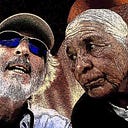In Here, Out There
A hot mess
It can seem as if there is an insurmountable gap between our subjective experience of the world and our attempts to objectively describe it. And yet our brains are made of matter — so, you might think, the states of mind they generate must be explicable in terms of states of matter. The question is: how? And if we can’t explain consciousness in physical terms, how do we find a place for it in an all-embracing view of the universe? THOMAS LEWTON, “A NEW PLACE FOR CONSCIOUSNESS IN OUR UNDERSTANDING OF THE UNIVERSE”
In here.
Out there.
Objective.
Subjective.
It’s a hot mess.
Funny Not Funny.
A comedian sets up a joke Friday night at 420 Broadway.
Old lady taking communion.
Nibbles a bit of wafer.
Leg of Christ.
That’s it.
Leg of Christ.
Stunned silence.
A bridge too far?
Suddenly, an explosion of laughter.
Leg of Christ.
Leg of Lamb.
Jesus, lamb of God.
Out there.
In here.
When I told the story of my near death experience at T or C’s Story Lab event, I spoke of how Carol, a New Jersey girl who I was dating my first year of college in Alabama, told me that upon her initial arrival two years prior she took her laundry to the local washateria. That’s what they call it there. Washateria. Carol, speaking…
“So when I got there I saw a sign in the window. No coloreds. So I couldn’t go in cause I had whites AND coloreds.”
Got a big laugh from the story-telling audience. I was surprised when Stella told me on the drive home that a few people thought what I said was racist.
In here.
Out there.
A hot mess.
A book.
Out there.
The Secret Life of the Lonely Doll: The Search For Dare Wright.
Read it.
Wrote a story on Medium.
Mr. Bear Is a Silly Old Thing
Something happened as I typed out the last words.
So I added an addendum before publishing.
I will read the story now…
It is an anxious, sometimes a dangerous thing to be a doll. Dolls cannot choose; they can only be chosen; they cannot “do”; they can only be done by. — Rumar Godden, The Doll’s House
Children never forget injustice. They forgive heaps of things grown-up people mind; but that sin is the unpardonable sin. — Virginia Woolf, The Voyage Out
“… a choker they made with a star charm hung from a black grosgrain ribbon — admiring herself in a heart-shaped Venetian mirror, wielding a golden tube of lipstick in her right hand and holding a bottle of perfume in her left.” — Jean Nathan, The Secret Life of the Lonely Doll: The Search for Dare Wright
Mother is dead.
A suffering artist like myself must start somewhere! But where? With Mother’s perfume?!
I spray mother’s perfume on her cold shoulders, on the drool stained sheets, on Edith’s hair, on Bongo the monkey’s chest.
Our room smells of dead roses.
Mother’s perfume… my perfume… L’Heure Bleue… the magic hour. The blue hour… twilight.
No, that can’t be right. Mother and I hadn’t gone to bed until very late. Past midnight, I think. We’d been drinking and talking, mother’s tobacco smoke wafting sticky sweet with perfume.
Some know-it-all gossip columnist wrote we spooned in bed. Can you believe it?! But it wasn’t anything sexual! Mother was my protector, my champion. That’s what mothers do, don’t they?
Destitute. Alone. Mother… gone. Brother, gone. Everyone gone. I am alone.
Beauty fades. My life is the bottle. I am so alone. Death at my door.
Jeffrey, please, think of me. Believe in me and my mother. Don’t believe the tawdry tales. Mother and I lived our lives as we wished them to be.
And so, I pray, may it be the same for you.
Long story short. I happened to pick up The Secret Life of The Lonely Doll: The Search for Dare Wright, by Jean Nathan. I was intrigued. Still am. Numerous internet trails later I decided to write the above.
I began Dare’s story intending a psychological creep show. As I wrote down the words, Dare called for a better ending. I obliged, and I am gratified.
In here.
Out there.
A hot mess.
Panpsychism, the view that all nature participates in consciousness, has been growing under the radar for some time in science. But it is now coming into plainer view. New Scientist is one of the last places one might have expected to find a serious, long-form account of panpsychism — one that, in the context, amounts to a defense.
Yet that’s just what science writer and filmmaker Thomas Lewton has been permitted by the editors to do. He tells us about his own journey at his site: “Studying physics, I thought telescopes and particle colliders would offer firm answers, but instead they raised more questions.”
And at New Scientist, he tells us why:
